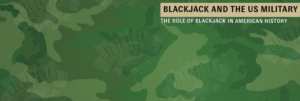Blackjack and the US Military: The Game’s Role in American History
Blackjack, also known as Twenty-One, is a popular card game played worldwide. While it is primarily associated with entertainment and gambling, blackjack has a surprising connection to the United States military, playing a unique role in American history. This article explores the intriguing relationship between blackjack and the US military, highlighting its impact on servicemen and the broader military culture. From boosting morale during war times to providing a means of relaxation and camaraderie, blackjack has left an indelible mark on the armed forces, contributing to the unique fabric of American military history.
21+ | Terms & Conditions Apply | NJ Residents Only
$25 FREE on Signup
100% up to $1.000 on First Deposit
Hotspot LeaderboardVisit Casino
Origins of Blackjack
To understand the connection between blackjack and the US military, it is essential to delve into the origins of the game. Blackjack traces its roots back to 17th-century France, where a similar game called “Vingt-et-Un” gained popularity. The game made its way to North America through French colonists, evolving over time to become the modern blackjack we know today. In the early 20th century, blackjack found its way into American casinos and quickly became a favorite among gamblers.
Blackjack during World War I
During World War I, blackjack started to establish its presence within the US military. American soldiers deployed overseas found solace in playing the game during their downtime. Blackjack offered an escape from the hardships of war, providing a form of entertainment and a sense of normalcy. Soldiers would gather in barracks or makeshift gambling halls to engage in friendly competitions, fostering camaraderie and a break from the stresses of combat. It became a popular pastime among soldiers, helping to boost morale and maintain a sense of unity.
Blackjack and World War II
In World War II, blackjack further solidified its role in the US military, gaining even more popularity among servicemen and becoming deeply ingrained in military culture. Soldiers would engage in blackjack games during long voyages on naval vessels, in makeshift gambling halls during breaks between battles, and in military establishments. The game served as a staple form of entertainment, offering a much-needed diversion from the harsh realities of war and fostering camaraderie among troops.
Beyond its recreational value, blackjack strategy and blackjack rules also played a significant role in the development of military strategy during World War II. Military leaders recognized the cognitive skills required for success in the game, such as strategic thinking, decision-making, and risk assessment. As a result, blackjack was incorporated into military training programs, where soldiers learned valuable lessons about probability, critical thinking, and adapting tactics based on changing circumstances. By honing their skills in blackjack, servicemen were able to enhance their ability to assess situations on the battlefield, make informed choices, and adapt their strategies to achieve favorable outcomes.
This integration of blackjack into military training exemplified the recognition of the game’s practical applications beyond mere entertainment. The principles learned through blackjack, such as evaluating probabilities, managing risks, and making calculated decisions, translated well into the complex and ever-evolving nature of warfare. By equipping soldiers with these critical thinking skills, blackjack contributed to their overall preparedness and effectiveness on the front lines.
The enduring popularity and practicality of blackjack within the US military during World War II not only provided much-needed respite for servicemen but also highlighted the game’s capacity to cultivate important cognitive skills applicable to real-world situations. The incorporation of blackjack into military training underscored the military’s innovative
Blackjack in Modern Military Culture
Even after World War II, blackjack continued to influence the US military. It became deeply ingrained in military culture, finding its way into military movies, novels, and anecdotes. The game’s popularity among soldiers endured through subsequent conflicts, including the Korean War, Vietnam War, and beyond. Blackjack has become a symbol of relaxation, bonding, and the soldier’s ability to find joy amidst challenging circumstances.
Today, blackjack remains a favorite game among active-duty personnel and veterans. Military-themed casinos and recreational facilities often feature blackjack tables, serving as reminders of the game’s historical significance. It continues to foster camaraderie and offers a shared experience among servicemen and women.
Blackjack and Veterans’ Organizations
Beyond its direct influence on active-duty personnel, blackjack has also found a place within veterans’ organizations. Many veterans’ associations and clubs organize blackjack tournaments and events as a way to bring former servicemen and women together. These gatherings provide an opportunity for veterans to reminisce, share stories, and strengthen their bonds through friendly competition. Blackjack serves as a bridge, connecting generations of veterans and fostering a sense of belonging and community.
Furthermore, veterans’ organizations often use blackjack as a fundraising tool. Charity events, such as casino nights or poker runs, frequently feature blackjack tables to engage participants and generate donations for veteran support programs. In this way, blackjack not only entertains but also contributes to the welfare and support of those who have served in the US military.
Blackjack and Military Gambling Regulations
While blackjack has been an integral part of military culture, the US armed forces has also implemented regulations regarding gambling activities, including blackjack, within its ranks. The military recognizes the potential risks associated with gambling, such as addiction, financial difficulties, and compromised security clearances.
To address these concerns, the military has established strict guidelines and policies regarding gambling activities. Servicemen and women are generally prohibited from participating in gambling activities while on duty or within military facilities. These regulations aim to promote responsible behavior, maintain discipline, and prevent the negative consequences of excessive gambling within the military community.
However, it’s important to note that these regulations do not entirely eliminate the presence of blackjack within the military. While gambling may be restricted in official capacities, informal or recreational games of blackjack can still occur among military personnel during their personal time and in non-military settings.
The military’s approach to gambling regulation reflects its commitment to upholding the integrity, professionalism, and focus required for national defense. By promoting responsible behavior and minimizing potential distractions, the military ensures that its personnel maintain the highest standards of performance and readiness.
Final Thoughts on Blackjack in the Military
The unexpected connection between blackjack and the US armed forces reveals the game’s multifaceted role in American history. From its origins as a French card game to its integration into military culture, blackjack has provided soldiers with entertainment, camaraderie, strategic thinking, and fundraising opportunities even prompted the establishment of regulations to ensure responsible behavior within the military community. The enduring popularity and influence of blackjack among military personnel and veterans demonstrate its lasting impact on the armed forces, making it an intriguing part of American military history.
21+ | Terms & Conditions Apply | NJ Residents Only
$25 FREE on Signup
100% up to $1.000 on First Deposit
Hotspot LeaderboardVisit Casino



